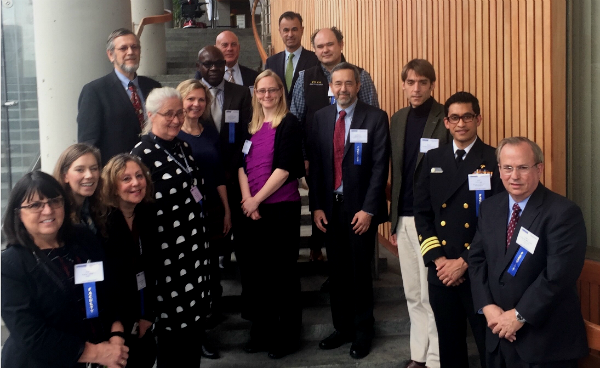
Einstein Global Health Center Conference participants
Editors’ Note: On Dec. 3 and Dec. 4, Einstein’s Global Health Center (GHC) hosted a conference titled, “Application of the One Health Approach to Global Health Centers” in conjunction with EcoHealth Alliance (EHA), a global environmental health nonprofit based in New York City. We invited GHC Associate Director Jill Raufman, M.P.H., M.S., and Catherine Machalaba, M.P.H, EHA policy adviser and research scientist, to share their thoughts on the event.
“A health threat anywhere is a health threat everywhere.” – Neil Vora, M.D., Career Epidemiology Field Officer, Division of State and Local Readiness, Centers for Disease Control and Prevention
This quote from Dr. Vora during the GHC conference highlights the challenges facing the global health community and the need to look at the big picture surrounding public health issues.
The aim of our GHC conferences is to focus on an important and trending topic in global health to be able to adapt information and approaches that will add value for global health centers and practitioners.
Examining the One Health Approach
This year, GHC chose the “One Health” approach (related or synonymous terms include “Planetary Health” and “EcoHealth”). One Health stresses that the health of all people is connected to the health of animals and the environment. Einstein was a natural choice for such a conference given its research portfolio, the opportunities and risks presented by New York City’s global connectivity, and an interested multidisciplinary community at the college.
While many international agencies have hosted One Health conferences, a medical school presented a unique opportunity to bring together a cadre of experts to identify points of relevance, integrate their knowledge and, ultimately, highlight areas of great value to the medical and global health communities; including fields which are usually not given the proper attention from the medical establishment .
Einstein partnered with EcoHealth Alliance, an organization expert in this field, to develop an agenda that embodied the One Health approach. We brought together a collection of professionals from fields such as human health, animal health, environmental conservation, economics, disaster risk reduction, and even a NASA scientist.
During her presentation, Olga Jonas, senior fellow, Harvard Global Health Institute, discussed how public health systems functioned for humans and animals. There is a gap, the economist explained, between capacity and coordination of those two systems, which might allow the spread of disease between them. Through better preparation, the One Health approach could help fill that gap by more quickly identifying risk from diseases that move from species to species. This would in turn reduce the cost and harm done that comes from panic and the rush to cope with disease, especially in countries with limited medical resources. Making sure that veterinary health and human health systems shared information could save lives and money.
“It’s not the pathogens–it’s the people,” she said.
Facing Global Health Challenges
Land conversion and degradation, climate change, and biodiversity loss present myriad health threats, and their effects are being felt by those most vulnerable and exposed. Extreme events such as flooding or drought lead to food and water insecurity, and the resilience of healthcare infrastructure is strained in many parts of the world.
What One Health does is seek information from multiple disciplines—human health, agriculture and livestock production, and ecology and climate monitoring—to help stakeholders most effectively understand the problem and tackle the risk factors and effects. By bringing together the information gathered from those disciplines and having multiple sectors lend a hand, relevant and optimal solutions can be achieved.
Why is this diversity of knowledge so important? Dr. Melinda Rostal, senior research scientist at EHA, highlighted how soil, vegetation, and rainfall are among the factors shaping one infectious disease in sub-Saharan Africa called Rift Valley Fever. The disease transmits to livestock via mosquito vectors but then migrates to humans. She shared an example of how working with anthropologists can be beneficial in devising culturally sensitive interventions that help prevent or slow the transmission of this disease.
The important role of clinicians was also emphasized at the conference – including the reporting of suspect cases and using advocacy and engagement to shape policies for healthier societies.
Education and One Health
The overall goal of this approach is to design programs and research to prevent disease and promote resilient populations. As it relates to medical schools, the question is: How can this approach be used in education to improve diverse patient and health system delivery outcomes?
We believe the event provided a unique opportunity to delve into the great variety of exciting topics within global health that can be advanced through One Health. We saw how important it is to incorporate the One Health approach into medical and global health curriculums to best serve patients, communities, and countries, because the health of humans, animals, and environments are all closely linked.
If you missed the conference, stay tuned for full video coverage!

